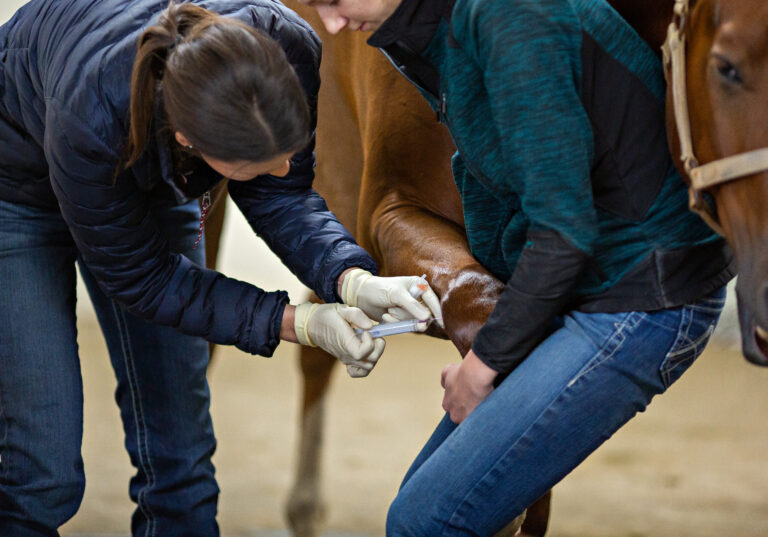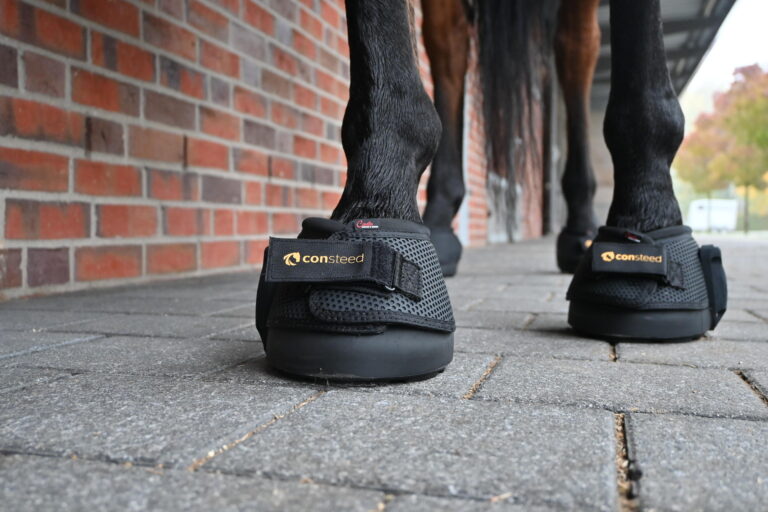
Horse sport’s social license to operate (SLO) has come under fire in recent years, particularly in horse racing and English disciplines. All involvement of horses in sport, however, is under public scrutiny. During the 2024 American Association of Equine Practitioners annual convention, Tom Lenz, DVM, MS, DACT, described proactive measures the American Quarter Horse Association (AQHA) is taking to promote equine welfare. Lenz is a past president of the AAEP and Honorary Vice President of the American Quarter Horse Association (AQHA), where he serves on the organization’s Welfare Commission.
“Social license to operate is kind of a new concept for us at AQHA,” he said. “That doesn’t mean we haven’t been working for a long, long time to improve the health and welfare of our horses.”
Lenz said SLO has come onto the organization’s radar within the past year primarily because of the work the USEF and FEI have been doing in response to high-profile horse welfare issues in sports such as show jumping, eventing, and dressage.
Complicating Factors
Lenz acknowledged the innate challenges of promoting good equine welfare and changing perceptions about horses’ well-being.
“When it comes to horse welfare, emotion and misinformation will override evidence and scientific fact almost every time if you get into a discussion with somebody, especially the public,” he said. “They’ll get emotional pretty quickly, and they make their decisions based on emotion, not on fact. If the public perceives there’s something wrong, there’s very little that you can do to change their mind.”
Lenz pointed out that many people’s perception of what constitutes good equine welfare is based on their own personal welfare. “So if they drive by my place, and my horse is standing in a foot of snow and it’s 10 below zero, they think, ‘My God, I’d be cold, so those horses must be freezing.’ But we know that’s not the case.” He calls this “well-meaning but without knowledge.”
Another complicating factor, said Lenz, is habituation or tradition regarding training and management practices that industry members might have perceived as distasteful or wrong at first but now view them as commonplace and acceptable.
“Just because your grandfather trained a horse this way, and just because your father trained a horse this way doesn’t mean it’s the right way to train a horse,” he said. The reasons people become habituated include:
- They’re new to the industry and they don’t know any better.
- They’ve been told we’ve always used these training methods.
- They’re intimidated by top trainers.
- They’re embarrassed to say anything.
- They want to win.
- They see it happening, but nobody’s getting disciplined.
Lenz said the AQHA’s role as a breed association is to ensure this type of habituation doesn’t happen. And the organization has strived to achieve this through the following welfare initiatives and programs.
AQHA Animal Welfare Commission
The Welfare Commission’s primary function is to make sure the rules, policies, and procedures set forth by the AQHA are in place to protect equine welfare and identify any issues that need to be addressed.
“If you have competition, you will always have people that are looking for a way to get an edge to get around standard training procedures and do something to get their horse a blue ribbon,” said Lenz. “So we try to keep ahead of that, and we recommend actions to the Executive Committee of how to deal with these types of cases.”
The Commission also stays up to date on animal welfare issues in other disciplines and around the world and serves as ambassadors to AQHA members, alliance partners, and the public in the areas of welfare and public policy.
Animal Welfare Grievance Committee
The AQHA’s Grievance Committee comprises judges, Professional Horsemen, veterinarians, and other association professionals who review violations that involve a judge’s disqualification for abuse or a steward’s warning card and then recommend a fine or penalty based on the level of violation.
AQHA Stewards’ Program
Through this program, stewards have the responsibility of:
- Monitoring the show ring for inhumane treatment of horses and unsportsmanlike conduct.
- Checking horses for equipment that is not permitted.
- Evaluating potentially unsafe showing conditions (e.g., poor footing).
- Patrolling stalls and warm-up areas for inhumane treatment of horses.
- Issuing welfare warning cards or removal from show grounds according to AQHA rules.
- Reporting inhumane treatment and unsportsmanlike conduct to show management.
“I think the stewards outside the ring are probably as important or more important than the stewards in the ring,” said Lenz. “People tend not to try to cheat or do anything in front of everybody else, but back at their own stall, they may do something they probably shouldn’t be doing.”
AQHA Professional Horseman
Professional Horseman association members adhere to and demonstrate the highest standards of personal and professional integrity. “These are elite trainers and horsemen that are experts in the field, and they set the bar for the rest of the association—for other people that are showing horses or training horses,” said Lenz. “Their job is to demonstrate good horsemanship and training methods to help train younger people. They educate the youth, they educate their clients, and they’re a really good asset to the association.”
AQHA Outreach and Education
The organization’s extensive outreach and education program provides annual training and testing for judges, stewards, and show management. Through this program, the AQHA also produces educational articles in the AQHA Journal, youth seminars, and the AQHLead membership education program. It also publishes current suspension lists online. “Probably the biggest deterrent to trainer or exhibitor cheating is to have their name on the suspension list for anyone in the world to see they’re not treating their horses appropriately,” said Lenz.
Performance Alteration and Drug Testing
Lenz said the AQHA’s drug policies are about the same as the USEF’s, except they don’t allow albuterol or clenbuterol. The AQHA Rulebook defines in detail what medications can be used and in what dosages, as well as what qualifies as a restricted, conditionally permitted, or prohibited substance. Any veterinarian treating a horse on show grounds must register with the association, be licensed in the state where the show is taking place, and be an AAEP member.
“I think that’s helped quite a bit in making sure we have ethical veterinarians on the ground,” said Lenz.
The AQHA also performs what it calls Performance Alteration Testing to screen horses for welfare issues somewhat unique to the Quarter Horse industry:
- Tail alterations to produce a “quiet” tail. Stewards test horses for their ability to raise the tail “to or above the horizontal plane.” Any horse found to have an altered tail is permanently banned from AQHA-sanctioned competitions.
- Neck alteration testing began at the 2022 World Show in response to some Western pleasure and trail exhibitors injecting irritating substances into horses’ neck muscles to create inflammation and pain and, therefore, limit mobility. During precompetition testing, AAEP veterinarians palpate, flex, and perform thermography imaging on horses to identify offenders.
Individual Member Reporting System
The AQHA has a system in place for people to report improper or inhumane treatment at horse shows to a judge, steward, or show manager. The AQHA also provides a form for people to fill out and submit (in addition to alerting local welfare authorities) if they see improper training or behavior at outside events or in their hometowns.
Take-Home Message
Social license to operate is a relatively new term in the Quarter Horse world, but that doesn’t mean the organization hasn’t been dealing with these issues for many years. When talking about welfare, Lenz recited one of his favorite Will Rogers quotes: “Everybody’s ignorant, only on different subjects.”
“Today, when we’re dealing with the public, their concern for horse welfare is probably at the highest it has been since we’ve had horses in this country,” he said. “But their knowledge about what constitutes good health and welfare is at its lowest.”
Therefore, said Lenz, AQHA’s members and leadership must continually work to improve the use and well-being of their horses. He urged them to continue asking, “Why do we do this? Why do we train this way? Why do we use this equipment? What’s in the best interest of the horse?”
“And then we have to be aware of the public,” he added. “I think that’s difficult sometimes, for trainers and owners that are really involved in the sport to be concerned about the public. One of the most difficult things we have to do as an association in introducing social license to operate is to convince them that when the day comes that the public doesn’t like what we’re doing, then we won’t get to do it anymore. So, we’re working hard to make changes—even hard changes—when they’re indicated.”
Related Reading
- Disease Du Jour: Role of the Permitted Treating Veterinarian
- Business Briefs: Horse Industry Statistics Veterinarians Should Know
- AAEP Health Coverage: Prevalence of Lameness in FEI Horses and Its Correlation to Performance
Stay in the know! Sign up for EquiManagement’s FREE weekly newsletters to get the latest equine research, disease alerts, and vet practice updates delivered straight to your inbox.


![[Aggregator] Downloaded image for imported item #18782](https://s3.amazonaws.com/wp-s3-equimanagement.com/wp-content/uploads/2025/11/03125751/EDCC-Unbranded-13-scaled-1-768x512.jpeg)

